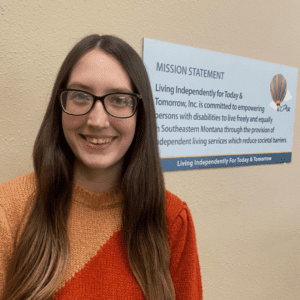It’s another entry in our”Wednesday Wisdom” series; Where we take you, our consumers, supporters, and readers inside of LIFTT to give a detailed picture of some portion of our programs, services, and operations. This week, Kasey Mook clerical assistant in LIFTT’s Self Direct Personal Care Assistance Program (SDPAS) takes us through the Service Delivery Record (SDR) process utilized by LIFTT consumers and their personal care attendants to document services rendered so that correct billing and payment may occur.
Service Delivery Records & Billing in the LIFTT SDPAS Program
By Kasey Mook, PCA Program Assistant

LIFTT SDPAS program clerical assistant Kasey Mook
Service Delivery Records (SDRs) or timesheets are turned in every other Monday in at LIFTT’s front desk. They are then reviewed and corrected and are properly input into our billing system and spreadsheets every other week. The Personal Care Attendant (PCA) Department refers to this process as SDR week. SDRs, also commonly referred to as timesheets, are sheets the PCA fills in with hours and tasks consistent with the consumers’ service plans and profiles. Timesheets come in four different forms: State Plan Service Delivery Record (SDR), Shopping and Community Integration (travel sheet), Medical Escort Record, and Home and Community Based Waiver Personal Assistance Services (HCBS waiver). When Community First Choice (CFC) was originally implemented, there were several more SDRs in use. LIFTT worked with Medicaid Administrators to pare the documents down to the 4 that we now use, as there was confusion among a lot of our consumers regarding the use of the documents. SDRs specifically contain tasks consisting of Activities of Daily Living (ADL), Health Maintenance Activities (HMA), and Instrumental Activities of Daily Living (IADL) along with time entered for those tasks.
The PCA Department receives timesheets in one of three ways: manually via original paper copy, by fax or by email. Once timesheets are collected and timestamped by the front desk team, they are logged into a binder at the reception desk labeled “SDRs Received.” This binder consists of lists of attendants and the consumers they work for. When logging timesheets, the date received along with the form (SDR, Travel, Medical Escort, or HCBS Waiver) are written down. Each consumer will receive a checklist with their corresponding timesheets for the following pay period that is sent to the PCA Department for review. The front desk logging is very important because it is proof of when and if a timesheet was even received.
Reviewing timesheets usually takes all day on SDR Monday, along with Tuesday as well. During that time, the PCA Department evaluates each individual timesheet to confirm hours and tasks are being used appropriately according to the consumers’ service plan and profile. If a timesheet is incompatible with a service plan, the attendant or consumer will be called in to make corrections by 5 pm that following Thursday. If corrections are not made by that time, the timesheets will not be processed and the attendant will not be paid until the following pay period, deeming the paperwork as “late.” It is unlawful for LIFTT to pay a PCA timesheet that is in question or has major errors. The LIFTT PCA Program follows Medicaid policies explicitly.
Once corrections are completed, mileage and hours worked are entered into our billing software, Home Health Services Manager (HHSM), and two separate payroll spreadsheets. One spreadsheet is a waiver usage sheet, that records waiver hours and miles by the month. (This waiver spreadsheet is put together at the end of the month in a report and is sent to Billings and Sidney Waiver offices.) The other, being the PCA Department’s typical spreadsheet, is used every pay period. It contains state and waiver hours, along with state mileage and the occasional medical mileage. (Medical miles are paid the following month. Example: Medical miles from September will not be paid until October.)
Designed by a software engineer named Alan Yoder, HHSM is software that was created specifically with Centers for Independent Living (CILs) in mind. This software contains all LIFTT’s active PCA consumers and their information such as diagnosis codes, Medicaid numbers, service plans, etc. to properly bill each consumer’s claim. This software is also designed to prevent overages in billing or usage. Once all hours are entered into billing (HHSM) and spreadsheets, these spreadsheets will be reviewed by three members of the PCA Department and sent up to Karie for payroll upon completion.
Every Monday, the 835 is downloaded and posted to HHSM. 835 is an electronic file that flips claims to be paid or denied, without having to do it manually. This file also shows additional payments for bonuses and health insurance reimbursement for our attendants. A billing process is also completed every Wednesday and uploaded to Montana’s Medicaid portal.
835 does not show why claims are denied, but remittance codes do. These codes are found in the electronic statement of remittance (eSOR) report. An eSOR report is a computerized printout of all claims submitted up until the previous Wednesday. The status of these claims is unknown until the following Tuesday when the eSOR report is uploaded to Montana’s Medicaid portal. These reports are then downloaded and stored in the shared file for easy accessibility throughout the year.
In conclusion, the work we do is very technical and requires a lot of attention to detail.
Thanks.
Kasey Mook, PCA Program Assistant, If you have any questions or comments please send an email to kaseym@liftt.org
About Living Independently for Today & Tomorrow (LIFTT): LIFTT is a Montana 501(c)3 corporation organized as a Center for Independent Living (CIL). With team members based in Billings, and Glendive, LIFTT provides people with disabilities with programs and services that help empower them to break down the physical, bureaucratic, and cultural barriers that prevent them from being fully independent participants in their lives and communities throughout 18 counties in southeastern and southcentral Montana: Big Horn, Carbon, Carter, Custer, Dawson, Fallon, Garfield, Golden Valley, McCone, Musselshell, Powder River, Prairie, Richland, Stillwater, Wibaux, and Yellowstone. For more information, please visit liftt.org or download our mobile app on Apple or Google Play.

